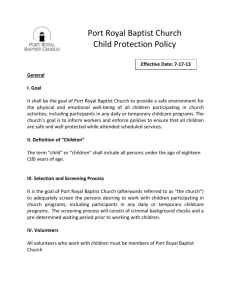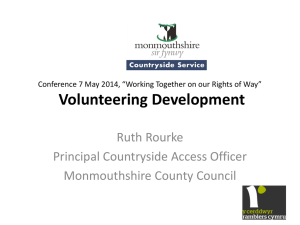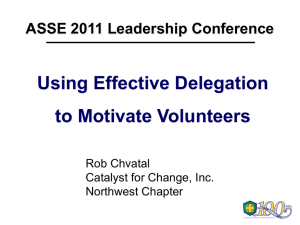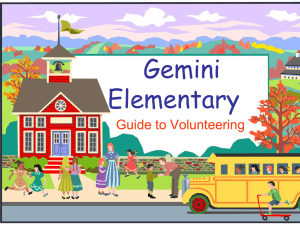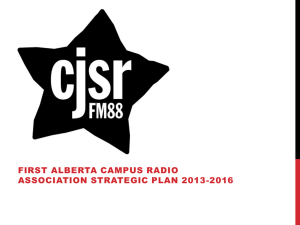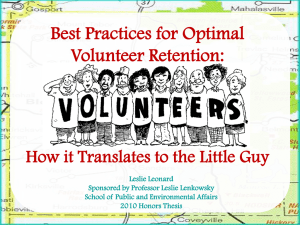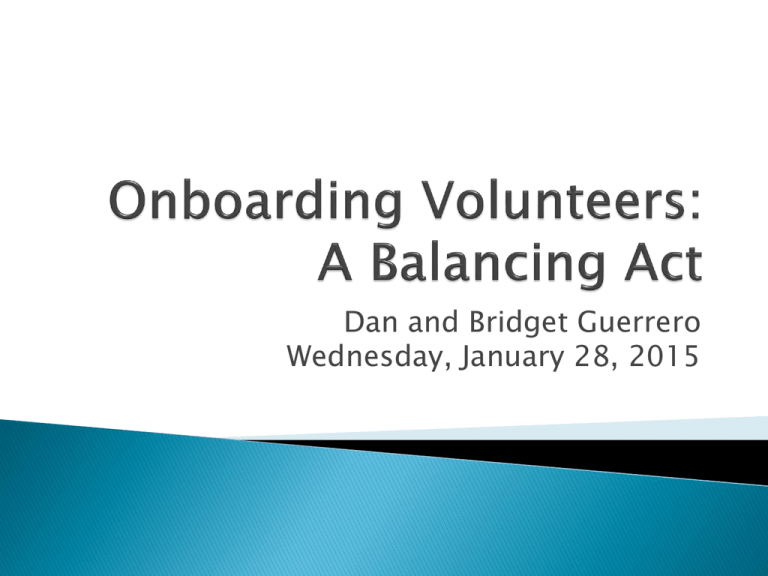
Dan and Bridget Guerrero
Wednesday, January 28, 2015
Speaker
You!
introductions
Logistics
Opening Exercise
Analyzing your organization’s needs
The process
◦
◦
◦
◦
Application
Orientation / Personal Interviews
Database checks (background, credit, license, etc)
Reference checks
Teen volunteers
Volunteers violating policy while supporting
your organization
You are the Volunteer Manager for a small, nonprofit nursing care
center for the elderly and disabled. You don’t have policies (other
than an informal interview) for bringing in volunteers.
One day, Jeff, 30, stops in to ask about volunteering. You
block him into the schedule as he seems to be a great guy.
Over the next 2 months, 2 residents fearfully confide in you
that Jeff has threatened them when they confronted him
about taking their loose cash/change from their rooms.
Jeff’s had a ‘reasonable’ answer each time.
Yesterday, a resident’s son brought in a copy of the
resident’s credit card bill, showing charges for Apple
products totaling $1,000.00, made from the facility (when
Jeff was on volunteer duty two weeks earlier).
◦ The son stated the resident was fearful of Jeff, and afraid to
tell staff she thought Jeff made the charges.
**Note: Most states require checks
on programs they regulate.
With your table mates, spend 5 minutes discussing what you
would have done over the previous 2 months, and what
you should do now.
You will have an opportunity to share with the larger seminar.
It is estimated that 2.1 million older Americans
are victims of abuse each year and approximately
80-90% of those cases go unreported.
Disruption at facility with police investigation
Potentially expensive lawsuit(s) against the
organization
Emotionally distressed patients
Loss of trust by patients and their families
Loss of other volunteers / potential
volunteers
PR problem for facility and it’s affiliates
What are your current, written policies on
screening volunteers?
Are the policies multi-dimensional?
Do these adequately support your needs?
◦ Vols drive clients? Motor vehicle registration checks
◦ Vols formally teach or train? Professional license
verification
◦ Access to your financial records? Credit checks
◦ Working with vulnerable population? Criminal
history checks
Who sets the requirements for your
volunteers?
Volunteer Registration
Essential Documents Quick
Reference Matrix
Individual Volunteers
What’s Required
Adult Program
Children and Youth
Programs **
x
x (3)
x
Family Programs
x
x
Completed Application
References
WSP Criminal Registry
Check (WATCH)
National Sex Offender
Registry Check
(www.nsopr.gov or
www.familywatchdog.us)
x
x (2)
x
x
x (3)
x
Employee and Volunteer
Disclosure Statement
HIPAA for Volunteers
Sexual Abuse Prevention
Flyer
Volunteer Service
Agreement
Volunteer Job Description
x
x
x
x
x
x
x
x
x
x
x
x
x
x
x
Volunteers with unsupervised access to youth may
have even more requirements- ex. FBI fingerprint (National Criminal
History Check)
Free text answer
blocks are great
Are the responses
appropriate?
Intent
YTP Examples:
◦ “I love
watching kids”
guy
◦ - “Loose cannon”
- Excerpt from YTP’s online volunteer application
The interview will give you a sense of the applicant’s
personality, living environment, hobbies, preferences
and strengths.
Trust your intuition. Both verbal and non-verbal
communication will be helpful in determining a possible
match or the appropriateness of the potential volunteer.
Rushing through this interview is a disservice to the
organization, the volunteer and the quality of the
match.
Find interview techniques at:
https://www.energizeinc.com/art/guidelines-usingquestions-conversation
Question- How does cultural competency play a part in
this process?
Understand the profiles of those who may
pursue volunteer opportunities for the wrong
reasons:
◦ Anyone seeking personal gain (for the wrong
reasons)
◦ Those seeking entry to vulnerable populations they
wouldn’t otherwise have access to:
◦ Sexual predators
◦ Those who violate elderly
◦ Those who violate challenged populations
National criminal history database check
(NCIC)
◦ Fingerprint based
State or County criminal background check
Commercial background checks
◦ Washington State Patrol (WSP)
◦ Cannot search FBI’s NCIC
◦ “Open Source” checks
◦ Responses may vary from provider to provider
Criminal records originate at the local level
and are “reported up” to the state periodically
There is no ‘perfect’ check
Offenders can have records expunged
Offenders often use aliases
Offenders will frequently move from state to state
Federal crimes are not registered in county or state
databases
◦ Juvenile offenses are often sealed
◦
◦
◦
◦
https://www.privacyrights.org/volunteerbackground-checks-without-giving-upprivacy
1.
2.
3.
Does your organization use the Washington
State Patrol’s WATCH database to perform
criminal history checks?
Does your organization contract with a
proprietary background check company? If
so, please share.
Has your organization migrated from one
type of check to another? Why?
Observations?
Sex offender registry
◦ County sheriffs forward offender register up to
Washington Assn of Sheriffs and Police Chiefs
◦ You can search by name for offenders
◦ Sex offenders are in the registry for life
If an offender moves and does not report to
the county sheriff in which they reside, public
records/databases will not be updated.
◦ Approximately 30% of offenders are absconders
◦ 3 Levels- Though Level I offenders are
characterized as unlikely to offend again, your
organization needs to discuss your threshold.
NSOPW.GOV
Search by name all 50 states
Updated by jurisdiction at different
rates
WA Assn of Sheriffs & P. Chiefs
www.icrimewatch.net
Search for offenders by
name/address
Updated daily
Info fed to NSOPW
Sex offenses
Felonies involving violence
All felonies other than violence or sex within
the last 10 years
Misdemeanor offenses involving violence
Misdemeanor drug or alcohol offenses within
5 years
Any other misdemeanor within 5 years that
would be considered a potential danger to
children
Your organization should consider creating
policy on:
◦ Volunteers who serve for many years- experts
recommend 2-5 year recheck
◦ Volunteers who leave and return (ex. CCS policy):
If they’ve been away >6 months: no requirement
6 mo – 2 yrs: new background
<2 years: new orientation, one reference and new
background check
Question for audience- Who has a built in
feature in their volunteer database that alerts
you to conduct a new background check?
CCS solicits in writing & follows up with
phone checks.
Telephone conversations allow more
flexibility:
◦ Listen for nervousness
◦ Tone of voice
◦ Hesitation
(CCS Reference Check handout)
Running third-party background checks on
minors falls under the Fair Credit Reporting Act
(FCRA), just as they would for any other applicant
or employee; therefore, careful understanding of
the nature of a minor’s consent is necessary for
nonprofits to be protected.
Under the law, minors cannot approve consent as
they cannot enter legally binding agreements
Maturity is lacking in understanding the
obligations of a legal contract
Your organization should require parental or
legal guardian’s consent to any checks
Majority of juvenile criminal records are
sealed until 18
Credit checks unavailable for those >18
Can do motor vehicle checks, employment
and education verification checks
So, increase vigilance in those checks you can
confirm
Your organization should have a policy on
providing volunteers copies of derogatory
findings that arise during onboarding
Are you safeguarding personal / confidential
findings?
What’s your privacy and data security policy?
◦ CCS YTP removed the requirement for individuals to
provide SSNs
Some volunteers are well intentioned, but not
performing well, or not a great fit for the role
For those volunteers, follow the “5 Re” plan:
◦
◦
◦
◦
◦
◦
Re-enforce
Reassign
Re-train
Re-vitalize
Refer
Retire
Be swift, but deliberate
Have a policy in place:
◦ Though uncommon, individuals will sue nonprofits
◦ Ask the volunteer not to come to the nonprofit until the
case has been evaluated
◦ Investigate the facts
◦ Document the findings
◦ Meet the volunteer Be specific
Don’t negotiate
Send follow up letter (may include positive thanks, but will
also communicate termination)
◦ Communicate the removal to other staff members, while
maintaining confidentiality (where needed)
Notify law enforcement
Refusing a potential volunteer or firing a
volunteer can be very unpleasant
In living with the “Mission First” concept, you
can always make the right decisions. We
always focus on the “safety and best interest
of our xxxxx”
◦ Where “XXXXX” are your children, your clients, your
animals, etc
Why does your organization need to screen
volunteers?
◦
◦
◦
◦
To
To
To
To
improve program quality and safety
comply with legal requirements
better match volunteers
reduce risk / limit liability
We have a moral, legal and ethical
responsibilities to our clients- have a sound
plan
Using a “comprehensive” approach to
onboarding volunteers is critical
https://www.privacyrights.org/volunteerbackground-checks-without-giving-upprivacy
http://volunteer.ca/content/screening-10steps
http://www.praesidiuminc.com/backgroundc
heck/nine_things_you_need_to_know_about_
background_checks.pdf
https://www.energizeinc.com/how_tos_volun
teer_management/screening
Contact: BridgetG@ccsww.org

